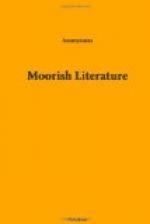ABENUMEYA’S LAMENT
The young Abenumeya, Granada’s royal
heir,
Was brave in battle with his foe and gallant
with the fair.
By lovely Felisarda his heart had been
ensnared,
The daughter of brave Ferri; the captain
of the guard.
He through the vega of Genii bestrode
his sorrel steed,
Alone, on melancholy thoughts his anxious
soul to feed,
The tints that clothed the landscape round
were gloomy as the scene
Of his past life, wherein his lot had
naught but suffering been.
His mantle hue was of iron gray bestrewn
with purple flowers,
Which bloomed amid distress and pain,
like hope of happier hours.
And on his cloak were columns worked,
(his cloak was saffron hued,)
To show that dark suspicion’s fears
had tried his fortitude;
His shield was blazoned with the moon,
a purple streak above,
To show that fears of fickleness are ever
born with love.
He bore an azure pennant ’neath
the iron of his spear,
To show that lovers oft go wrong deceived
by jealous fear.
The hood he wore was wrought of gold and
silk of crimson clear;
His bonnet crest was a heron plume with
an emerald stone beneath;
And under all a motto ran, “Too
long a hope is death.”
He started forth in such array, but armed
from head to heel
With tempered blade and dagger and coat
of twisted steel.
And hangling low at his saddle-bow was
the helmet for his head;
And as he journeyed on his way the warrior
sighed and said:
“O Felisarda, dearest maid, him
in thy memory keep
Who in his soul has writ thy name in letters
dark and deep.
Think that for thee in coat of mail he
ever rides afield,
In his right hand the spear must stand,
his left must grasp the shield.
And he must skirmish in the plain and
broil of battle brave,
And wounded be, for weapons ne’er
from jealousy can save.”
And as he spoke the lonely Moor from out
his mantle’s fold
With many a sigh, that scorched the air,
a lettered page unrolled.
He tried in vain to read it but his eyes
with tears were blind,
And mantling clouds of sorrow hid the
letters from his mind.
The page was moistened by the tears that
flowed in plenteous tide,
But by the breath of sighs and sobs the
softened page was dried.
Fresh wounds he felt at sight of it, and
when the cause he sought,
His spirit to Granada flew upon the wings
of thought.
He thought of Albaicin, the palace of
the dame,
With its gayly gilded capitals and its
walls of ancient fame.
And the garden that behind it lay in which
the palm was seen
Swaying beneath the load of fruit its
coronet of green.
“O mistress of my soul,” he
said, “who callest me thine own,
How easily all bars to bliss thy love
might trample down!
But time, that shall my constancy, thy
fickleness will show,




